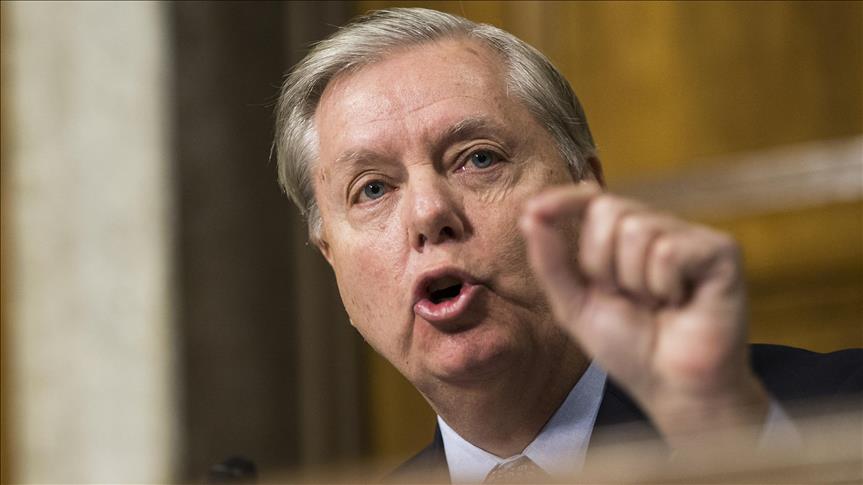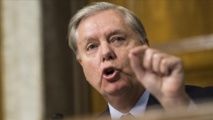Senators including top Republicans Lindsey Graham and Marco Rubio said that withdrawing from the war-torn country at this time would be "a premature and costly mistake."
"If you decide to follow through with your decision to pull our troops out of Syria, any remnants of ISIS in Syria will surely renew and embolden their efforts in the region," the letter read.
The senators added that the move may also embolden the "brutal dictatorship of Bashar al Assad," the Syrian president, and bolster US "adversaries" Iran and Russia.
"Your administration must not repeat the same mistakes that previous administrations have made and concede to these bad actors," read the letter, also signed by Democrat Jeanne Shaheen, independent Angus King and Republicans Tom Cotton and Joni Ernst.
More than 2,000 US service members were sent to the war-torn country to work alongside Syrian rebels to defeat Islamic State, also known as ISIS. Their primary role has been to train local forces to fight the terrorist organization.
The president has previously indicated his desire to get out of Syria although other US officials have said US troops should remain and it's too early to claim the defeat of Islamic State.
"We have won against ISIS," Trump claimed in a video posted on Twitter late on Wednesday.
"We've beaten them, and we've beaten them badly, we've taken back the land, and now it's time for our troops to come back home," he added.
White House officials said earlier in the day that the unexpected decision to pull out was made by Trump and is consistent with his prior statements on the conflict.
"Five years ago, ISIS was a very powerful and dangerous force in the Middle East, and now the United States has defeated the territorial caliphate," White House spokeswoman Sarah Sanders said in a statement.
The White House didn't provide a time line for the withdrawal. Sanders said US would remain engaged with allies in the coalition to defeat the terrorist group and "stand ready to re-engage at all levels" to defend US interests.
The White House announcement came as a surprise as recent statements by top Trump administration officials indicated US troops would remain.
"I think it's fair to say Americans will remain on the ground after the physical defeat of the caliphate, until we have the pieces in place to ensure that the defeat is enduring," Brett McGurk, the US special envoy for the global coalition to counter Islamic State, said only last week.
"Even as the end of the physical caliphate is clearly now coming into sight, the end of ISIS will be a much more long-term initiative," he said.
Chairman of the Joint Chiefs of Staff General Joe Dunford said two weeks ago that despite the progress, US forces were not expected to withdraw from the country any time soon.
"We still have a long way to go and so I'd be reluctant to give a fixed time," Dunford told the Washington Post.
A withdrawal of US forces also puts US allies, namely the Kurds, at risk, Graham said earlier on Twitter. The US is allied with the People's Protection Units (YPG), a Syrian Kurdish militia, which controls large areas of northern Syria on the border with Turkey.
The US has relied on Kurdish forces as the most effective in the fight against Islamic State in Syria, but that has aggravated Turkey, which believes the YPG is tied to the outlawed Kurdistan Workers' Party (PKK) waging an insurgency within Turkey.
Turkish President Recep Tayyip Erdogan last week announced that Turkey would launch a new military offensive against Kurdish militants east of the Euphrates river in northern Syria.
Trump informed Erdogan of the decision to withdraw, but did not discuss the withdrawal with him, a White House official said in a conference call.
Russia, which has been backing President Bashar al-Assad during nearly eight years of civil war, complained earlier on Wednesday about US presence in the country.
"The illegal American presence in Syria is changing from a factor in the fight against international terrorism into a dangerous obstacle to settlement," Russian Foreign Ministry's spokeswoman Maria Zakharova said on Twitter.
"If you decide to follow through with your decision to pull our troops out of Syria, any remnants of ISIS in Syria will surely renew and embolden their efforts in the region," the letter read.
The senators added that the move may also embolden the "brutal dictatorship of Bashar al Assad," the Syrian president, and bolster US "adversaries" Iran and Russia.
"Your administration must not repeat the same mistakes that previous administrations have made and concede to these bad actors," read the letter, also signed by Democrat Jeanne Shaheen, independent Angus King and Republicans Tom Cotton and Joni Ernst.
More than 2,000 US service members were sent to the war-torn country to work alongside Syrian rebels to defeat Islamic State, also known as ISIS. Their primary role has been to train local forces to fight the terrorist organization.
The president has previously indicated his desire to get out of Syria although other US officials have said US troops should remain and it's too early to claim the defeat of Islamic State.
"We have won against ISIS," Trump claimed in a video posted on Twitter late on Wednesday.
"We've beaten them, and we've beaten them badly, we've taken back the land, and now it's time for our troops to come back home," he added.
White House officials said earlier in the day that the unexpected decision to pull out was made by Trump and is consistent with his prior statements on the conflict.
"Five years ago, ISIS was a very powerful and dangerous force in the Middle East, and now the United States has defeated the territorial caliphate," White House spokeswoman Sarah Sanders said in a statement.
The White House didn't provide a time line for the withdrawal. Sanders said US would remain engaged with allies in the coalition to defeat the terrorist group and "stand ready to re-engage at all levels" to defend US interests.
The White House announcement came as a surprise as recent statements by top Trump administration officials indicated US troops would remain.
"I think it's fair to say Americans will remain on the ground after the physical defeat of the caliphate, until we have the pieces in place to ensure that the defeat is enduring," Brett McGurk, the US special envoy for the global coalition to counter Islamic State, said only last week.
"Even as the end of the physical caliphate is clearly now coming into sight, the end of ISIS will be a much more long-term initiative," he said.
Chairman of the Joint Chiefs of Staff General Joe Dunford said two weeks ago that despite the progress, US forces were not expected to withdraw from the country any time soon.
"We still have a long way to go and so I'd be reluctant to give a fixed time," Dunford told the Washington Post.
A withdrawal of US forces also puts US allies, namely the Kurds, at risk, Graham said earlier on Twitter. The US is allied with the People's Protection Units (YPG), a Syrian Kurdish militia, which controls large areas of northern Syria on the border with Turkey.
The US has relied on Kurdish forces as the most effective in the fight against Islamic State in Syria, but that has aggravated Turkey, which believes the YPG is tied to the outlawed Kurdistan Workers' Party (PKK) waging an insurgency within Turkey.
Turkish President Recep Tayyip Erdogan last week announced that Turkey would launch a new military offensive against Kurdish militants east of the Euphrates river in northern Syria.
Trump informed Erdogan of the decision to withdraw, but did not discuss the withdrawal with him, a White House official said in a conference call.
Russia, which has been backing President Bashar al-Assad during nearly eight years of civil war, complained earlier on Wednesday about US presence in the country.
"The illegal American presence in Syria is changing from a factor in the fight against international terrorism into a dangerous obstacle to settlement," Russian Foreign Ministry's spokeswoman Maria Zakharova said on Twitter.









 Home
Home Politics
Politics











